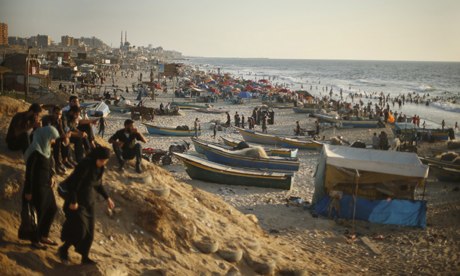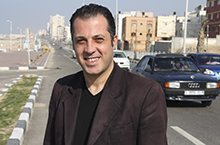Israel/Palestine
Related: About this forumGoodbye Gaza: our correspondent reflects on her time in the Middle East

The beach in Gaza City, 'Gaza's one magnificent natural asset'. Photograph: Mohammed Salem/Reuters
Harriet Sherwood
The Observer, Saturday 25 January 2014 17.05 EST
After three years reporting on the Palestinian-Israeli conflict, our Middle East correspondent is coming home to the UK. With heavy heart she pays a farewell visit to Gaza and pays tribute to the resilience, creativity and humor of its people.
Hazem Balousha was uncharacteristically despondent when he greeted me recently at the end of my long walk through the open-air caged passageway that separates the modern hi-tech state of Israel from the tiny, impoverished, overcrowded Gaza Strip.
Hazem has been a colleague and a friend for three and a half years, a relationship built over more than 20 visits I've made to Gaza. He arranges interviews and provides translation; but most importantly he helps me understand the people, the politics and the daily struggle of life in Gaza. We have talked for hours in his car, over coffee, at his home. He has accompanied me to grim refugee camps and upmarket restaurants; to the tunnels in the south and farms in the north; to schools and hospitals; to bomb sites and food markets; to the odd wedding party and rather more funerals. In the face of Gaza's pressure-cooker atmosphere and bleak prospects, he – like so many I've met here – has always been remarkably good-humoured.
snip* "This is what we have come to. We wake up in the night worrying about small things: cooking gas, the next power cut, how to find fuel for the car," he said dejectedly. "We no longer care about the big things, the important things, the future – we just try to get through each day."

Hazem Balousha.
remainder: http://www.theguardian.com/world/2014/jan/25/goodbye-gaza-harriet-sherwood-palestine-israel
Jefferson23
(30,099 posts)The Gaza Strip is facing a severe shortage of potable water and immediate action is necessary, Israeli and Palestinian experts said Monday.
Without the provision of water to meet basic needs in the near future, Gaza could see a spike in diseases due to the reduction in the quality of water available, the environmental and water experts warned at a conference hosted by Tel Aviv's Eretz Israel Museum.
A collaboration by Friends of the Earth Middle East and the Institute for National Security Studies, the conference focused on including environmental and water issues in the talks between Israel and the Palestinian Authority.
Among the participants was Prof. Uri Shani, former head of the Water Authority and current Israeli representative in the talks with the Palestinians and Jordanians on water. Shani said Gaza already has a high rate of water pollution-related childhood illnesses, which threaten to cross over to Israel as well. Shani said the international project to establish a desalination plant for Gaza would take years to complete and warned that an additional supply of water is needed now.
Another participant in the conference was Dr. Mohammed al-Hamidi, former director of the Environment Ministry in the Palestinian Authority and now a private environmental consultant. He said there are types of desalination plants that could be set up more quickly if Israel were more flexible and did not hold up permits for their construction. He agreed with Shani that regardless of the progress on the peace process, there was an urgent need to alleviate the water shortage in Gaza.
“Hamas is not working to solve the water problem. Israel has ignored it too, and so far has not kept its promises to increase the water supply,” said Gidon Bromberg, the Israeli director of Friends of the Earth Middle East, after the conference. “In addition, there are problems with the electricity supply in the Gaza Strip, which makes it difficult to construct desalination or sewage treatment facilities. We are facing a disaster, since in a little while there will be no water in Gaza. No fence will stop a million and a half people - with no reprieve offered by Hamas - who will try to reach Israel so that they will have water to drink.”
The inhabitants of the Gaza Strip are almost completely dependent on water from the southern coastal aquifer. But increased demand is depleting the aquifer, and it is increasingly vulnerable to penetration by seawater and saltwater penetration from deep layers of soil. In addition, with the lack of treatment facilities sewage is trickling through the soil and threatening contamination.
http://www.haaretz.com/news/diplomacy-defense/.premium-1.571074
Jefferson23
(30,099 posts)By Abdulrahman Murad
Abdulrahman Murad is a Gaza-based blogger and freelance journalist. His writings have appeared on Middle East Monitor, Mondoweiss, and Al-RAY Media. Follow him on Twitter and on his blog.
For years, Israeli restrictions and unexpected closures of the Gaza Strip's lone commercial crossing have caused severe losses for strawberry growers in the coastal enclave, whose produce is mainly destined for European markets.
But in the current growing season, which began in November and continues through February, the losses have been doubled, as a heavy winter storm hit the region in December, damaging their fields and ripe crops.
Among those coping with the loss is Khader al-Khatib, 58, who planted a patch of nearly two acres with strawberry, hoping to provide for his 20-member family.
"Half of my strawberries have been swamped with water and the other half damaged by severe cold," he told Ma'an.
http://www.maannews.net/eng/ViewDetails.aspx?ID=668409
Jefferson23
(30,099 posts)Following are images of the fishing docks in Gaza as captured by B'Tselem field researcher Muhammad Sabah. There is no denying the colorful sight of so many boats moored in the harbor. Yet in point of fact, the picturesque sight is evidence of a grim reality, with the boats out of commission and the docks deserted.
The Oslo Accords granted Gaza's fishermen a fishing range of 20 nautical miles (approx. 37 kilometers) from shore. Yet this arrangement was never actually implemented. Instead, over the years, the military restricted fishing to a range of three to twelve nautical miles. At present, the fishing range is limited to a mere six nautical miles (approx. 11 kilometers) off Gaza's shore. Any fishermen who venture beyond this limited range risk being shot at, arrested, and having boats and fishing gear confiscated. This policy has seriously cut into the income of thousands of families. It has also made fish – formerly a low-cost food staple in Gaza – scarce.
In addition to Israel's strict limitations on fishing, Gaza has also been experiencing a severe fuel shortage over the past few months, ever since Egypt demolished tunnels on its border and operation was suspended in the majority of remaining tunnels. Fuel from Israel is too costly for most residents of the Gaza Strip. This means that fishermen cannot afford the fuel necessary for running their boats, bringing the fishing industry to a standstill.
http://www.btselem.org/photoblog/20140129_gaza_fishermen
 ?1390988466
?1390988466
 ?1390988479
?1390988479
 ?1390988492
?1390988492
 ?1390988513
?1390988513